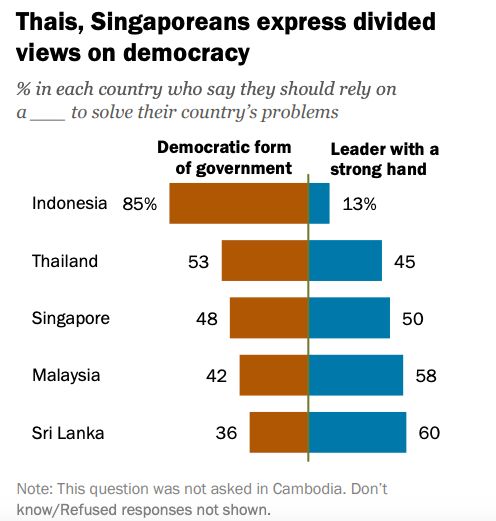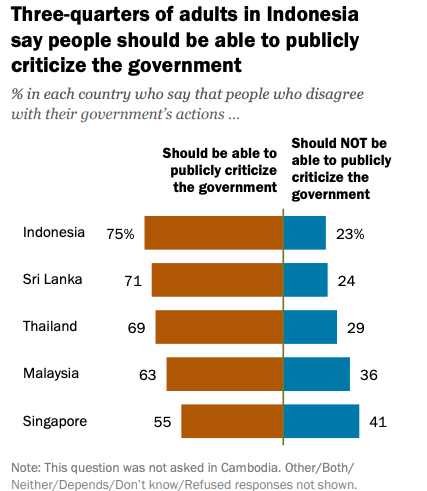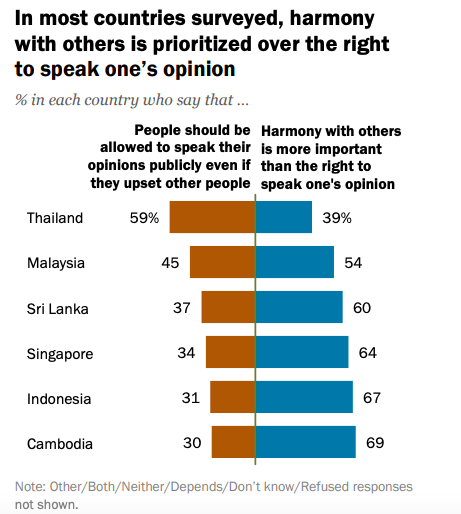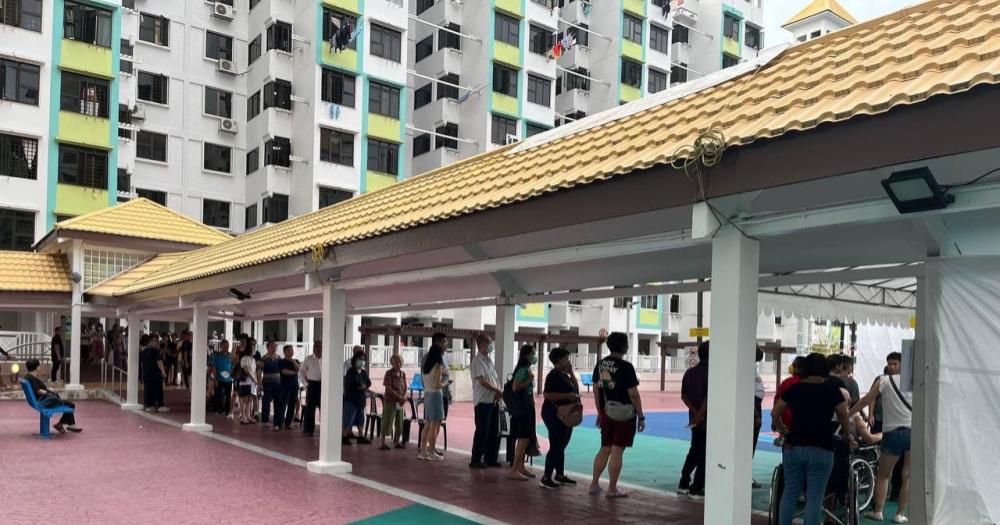More Singaporeans prefer a leader with a strong hand over a democratic form of government, according to a survey carried out by Pew Research Center, a U.S. think tank based in Washington, D.C.
The survey had asked respondents from five countries — Indonesia, Thailand, Malaysia, Singapore and Sri Lanka — to choose between a “democratic form of government” or a “leader with a strong hand” as the better option to solve their country’s problems.
It was part of a wider study on Buddhism, Islam and religious pluralism in Southeast Asia and South Asia, and was carried out from Jun. 1 to Sep. 4 in 2022.
Interviews in Singapore and Malaysia were carried out via computer-assisted telephone interviewing (CATI) using mobile phones, while interviews in Thailand, Indonesia and Sri Lanka were administered face-to-face through tablet devices.
Less than half of respondents in Singapore prefer democratic form of government
Some 50 per cent of the 2,036 respondents from Singapore said they preferred a strong leader, while 48 per cent said they preferred a democratic form of government.
In comparison, 85 per cent of 2,571 respondents from Indonesia said they preferred a democratic government, while only 13 per cent said they preferred a strong leader.
The survey added that this question was not asked in Cambodia due to "local political sensitivities".
It also noted that across the surveyed countries, adults with more education, and below the age of 35, are more likely than those with less education and older to prefer a democratic form of government.
 Screenshot via Pew Research Centre
Screenshot via Pew Research Centre
Singaporeans less supportive of criticising government in public
The survey also asked whether those who disagree with the government should be able to express their criticism publicly.
With the exception of Singapore, over 60 per cent of respondents from the other four countries said they should be able to publicly criticise the government.
The highest proportion of respondents who responded in the affirmative to this question was from Indonesia, at 75 per cent.
In addition, Singapore was the only country out of the five in which over 40 per cent of respondents said people should not be able to criticise the government publicly.
 Screenshot via Pew Research Centre
Screenshot via Pew Research Centre
The survey also noted that within Singapore, there are considerable differences by religious groups.
Singaporean Christians, at 59 per cent, and those with no religion, at 65 per cent, are the most likely to say that people should be able to publicly criticise the government if they disagree with its actions.
Meanwhile, those who follow traditional Chinese religions, at 40 per cent, are the least supportive.
Less than half of Singaporeans with secondary education or below believe government should be publicly criticised
In breaking down the responses by education level, the survey noted that across all five countries, respondents with a higher level of education are more likely than those with less education to support the right to publicly criticise the government if they disagree with the government's actions.
The survey also pointed out that the gap is the largest in Singapore, where 64 per cent of respondents with higher education, defined as above secondary school, support the right to criticise the government, while only 40 per cent of those with lower education, defined as secondary school and below, support the same right.
In comparison, more than 60 per cent of respondents with lower education in the other four countries supported the right to criticise the government.
Younger adults between the ages of 18 and 34 are also more likely to support public criticism in Singapore, Indonesia and Thailand, with 67 per cent of young Singaporeans backing such a right, compared to just 50 per cent over the age of 35.
 Screenshot via Pew Research Centre
Screenshot via Pew Research Centre
Except for Thailand, most respondents think harmony with others is more important than right to own opinion
The survey also asked if it is better to speak one's opinion, even if it may upset others, or maintain harmony with others.
Here, with the exception of Thailand, the majority of respondents placed greater importance on harmony with others.
Within Singapore, 64 per cent of respondents said harmony with others is more important than the right to voice one's opinion.
As for Thailand, 59 per cent of 2,504 respondents were in favour of speaking their opinions publicly even if it upsets others.
 Screenshot via Pew Research Centre
Screenshot via Pew Research Centre
The survey further noted that Thai Muslims differed from the Buddhist majority on this question however, with 52 per cent placing greater importance on harmony with others, while only 38 per cent of Thai Buddhists took the same stance.
Top photo by Mothership reader
If you like what you read, follow us on Facebook, Instagram, Twitter and Telegram to get the latest updates.



